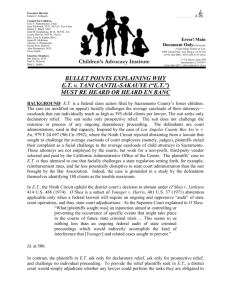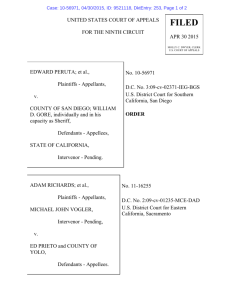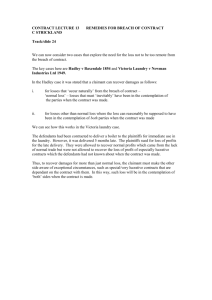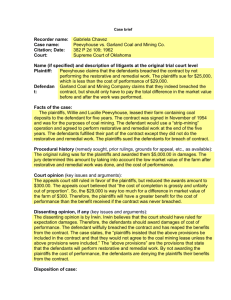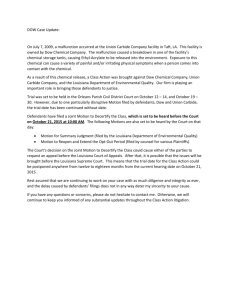Byrne v vanTienhoven
advertisement
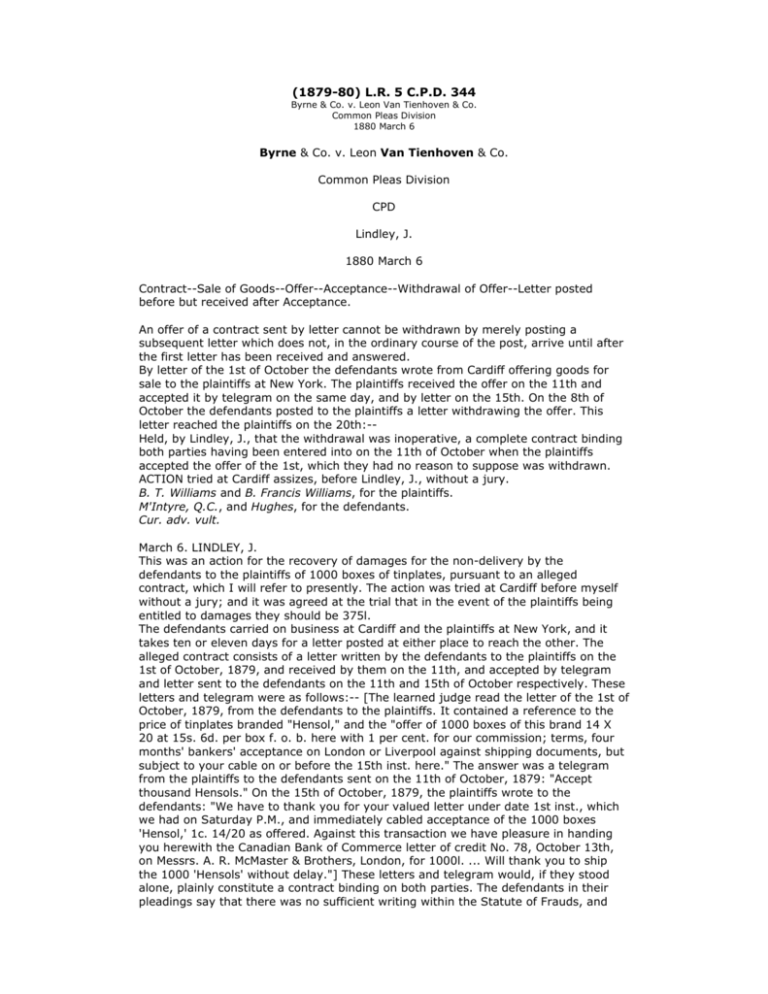
(1879-80) L.R. 5 C.P.D. 344 Byrne & Co. v. Leon Van Tienhoven & Co. Common Pleas Division 1880 March 6 Byrne & Co. v. Leon Van Tienhoven & Co. Common Pleas Division CPD Lindley, J. 1880 March 6 Contract--Sale of Goods--Offer--Acceptance--Withdrawal of Offer--Letter posted before but received after Acceptance. An offer of a contract sent by letter cannot be withdrawn by merely posting a subsequent letter which does not, in the ordinary course of the post, arrive until after the first letter has been received and answered. By letter of the 1st of October the defendants wrote from Cardiff offering goods for sale to the plaintiffs at New York. The plaintiffs received the offer on the 11th and accepted it by telegram on the same day, and by letter on the 15th. On the 8th of October the defendants posted to the plaintiffs a letter withdrawing the offer. This letter reached the plaintiffs on the 20th:-Held, by Lindley, J., that the withdrawal was inoperative, a complete contract binding both parties having been entered into on the 11th of October when the plaintiffs accepted the offer of the 1st, which they had no reason to suppose was withdrawn. ACTION tried at Cardiff assizes, before Lindley, J., without a jury. B. T. Williams and B. Francis Williams, for the plaintiffs. M'Intyre, Q.C., and Hughes, for the defendants. Cur. adv. vult. March 6. LINDLEY, J. This was an action for the recovery of damages for the non-delivery by the defendants to the plaintiffs of 1000 boxes of tinplates, pursuant to an alleged contract, which I will refer to presently. The action was tried at Cardiff before myself without a jury; and it was agreed at the trial that in the event of the plaintiffs being entitled to damages they should be 375l. The defendants carried on business at Cardiff and the plaintiffs at New York, and it takes ten or eleven days for a letter posted at either place to reach the other. The alleged contract consists of a letter written by the defendants to the plaintiffs on the 1st of October, 1879, and received by them on the 11th, and accepted by telegram and letter sent to the defendants on the 11th and 15th of October respectively. These letters and telegram were as follows:-- [The learned judge read the letter of the 1st of October, 1879, from the defendants to the plaintiffs. It contained a reference to the price of tinplates branded "Hensol," and the "offer of 1000 boxes of this brand 14 X 20 at 15s. 6d. per box f. o. b. here with 1 per cent. for our commission; terms, four months' bankers' acceptance on London or Liverpool against shipping documents, but subject to your cable on or before the 15th inst. here." The answer was a telegram from the plaintiffs to the defendants sent on the 11th of October, 1879: "Accept thousand Hensols." On the 15th of October, 1879, the plaintiffs wrote to the defendants: "We have to thank you for your valued letter under date 1st inst., which we had on Saturday P.M., and immediately cabled acceptance of the 1000 boxes 'Hensol,' 1c. 14/20 as offered. Against this transaction we have pleasure in handing you herewith the Canadian Bank of Commerce letter of credit No. 78, October 13th, on Messrs. A. R. McMaster & Brothers, London, for 1000l. ... Will thank you to ship the 1000 'Hensols' without delay."] These letters and telegram would, if they stood alone, plainly constitute a contract binding on both parties. The defendants in their pleadings say that there was no sufficient writing within the Statute of Frauds, and that they contracted only as agents; but these contentions were very properly abandoned as untenable, and do not require further notice. The defendants, however, raise two other defences to the action which remain to be considered. First, they say that the offer made by their letter of the 1st of October was revoked by them before it had been accepted by the plaintiffs by their telegram of the 11th or letter of the 15th. The facts as to these are as follows: On the 8th of October the defendants wrote and sent by post to the plaintiffs a letter withdrawing their offer of the 1st. The material part of this letter was as follows: "Confirming our respects of the 1st inst. we hasten to inform you that there having been a regular panic in the tinplate market during the last few days, which has caused prices to run up about twenty-five per cent. we are reluctantly compelled to withdraw any offer we have made to our constituents, and must therefore also consider our offer to you for 1000 boxes 'Hensols' at 17s. 6d. to be cancelled from this date." This letter of the 8th of October reached the plaintiffs on the 20th of October. On the same day the plaintiffs telegraphed to the defendants demanding shipment, and sent them a letter insisting on completion of the contract. [The learned judge read the letter. In it the plaintiffs expressed astonishment at the contents of the letter of the 8th, recapitulated the transactions, and said "practically and in fact a contract for 1000 boxes came into existence between you and ourselves. It requires the consent of both parties to a contract to cancel same. If instead of writing to us on the 8th you had cabled 'offer withdrawn,' you would have protected yourselves and us too. We disposed of the 1000 boxes on the 17th at a net profit of 1850 dollars. .. We write our friend Philip S. Philips, Esq., of Aberkllery, requesting him to call on you and demand delivery as agreed." In a postscript they added, "You speak of offer of 1000 boxes Hensol at 17s. 6d. The only firm offer we received from you under date 1st of October was 1000 boxes at 15s. 6d., and ten per cent. f. o. b. Cardiff; we cable you to-night 'demand shipment."'] This letter is followed by one from the defendants to the plaintiffs of the 25th of October refusing to complete. [The learned judge read it. The defendants acknowledged the receipt of the cable message of the 20th, inclosed the credit note sent in the letter of the 15th, and added, "Our offer having been withdrawn by our letter of the 8th inst. we now return the above credit, for which we have no further need, but take this opportunity to observe that in case of any future business proposals between us, we must request you to conform to our rules and principles, which require bankers' credit in this country, whereas the firm of A. R. McMaster & Brothers are not classified as such."] There is no doubt that an offer can be withdrawn before it is accepted, and it is immaterial whether the offer is expressed to be open for acceptance for a given time or not: Routledge v. Grant. [FN1] For the decision of the present case, however, it is necessary to consider two other questions, viz.: 1. Whether a withdrawal of an offer has any effect until it is communicated to the person to whom the offer has been sent? 2. Whether posting a letter of withdrawal is a communication to the person to whom the letter is sent? FN1 4 Bing. 653. It is curious that neither of these questions appears to have been actually decided in this country. As regards the first question, I am aware that Pothier and some other writers of celebrity are of opinion that there can be no contract if an offer is withdrawn before it is accepted, although the withdrawal is not communicated to the person to whom the offer has been made. The reason for this opinion is that there is not in fact any such consent by both parties as is essential to constitute a contract between them. Against this view, however, it has been urged that a state of mind not notified cannot be regarded in dealings between man and man; and that an uncommunicated revocation is for all practical purposes and in point of law no revocation at all. This is the view taken in the United States: see Tayloe v. Merchants Fire Insurance Co. [FN2] cited in Benjamin on Sales, pp. 56-58, and it is adopted by Mr. Benjamin. The same view is taken by Mr. Pollock in his excellent work on Principles of Contract, ed. ii., p. 10, and by Mr. Leake in his Digest of the Law of Contracts, p. 43. This view, moreover, appears to me much more in accordance with the general principles of English law than the view maintained by Pothier. I pass, therefore, to the next question, viz., whether posting the letter of revocation was a sufficient communication of it to the plaintiff. The offer was posted on the 1st of October, the withdrawal was posted on the 8th, and did not reach the plaintiff until after he had posted his letter of the 11th, accepting the offer. It may be taken as now settled that where an offer is made and accepted by letters sent through the post, the contract is completed the moment the letter accepting the offer is posted: Harris' Case [FN3]; Dunlop v. Higgins [FN4], even although it never reaches its destination. When, however, these authorities are looked at, it will be seen that they are based upon the principle that the writer of the offer has expressly or impliedly assented to treat an answer to him by a letter duly posted as a sufficient acceptance and notification to himself, or, in other words, he has made the post office his agent to receive the acceptance and notification of it. But this principle appears to me to be inapplicable to the case of the withdrawal of an offer. In this particular case I can find no evidence of any authority in fact given by the plaintiffs to the defendants to notify a withdrawal of their offer by merely posting a letter; and there is no legal principle or decision which compels me to hold, contrary to the fact, that the letter of the 8th of October is to be treated as communicated to the plaintiff on that day or on any day before the 20th, when the letter reached them. But before that letter had reached the plaintiffs they had accepted the offer, both by telegram and by post; and they had themselves resold the tin plates at a profit. In my opinion the withdrawal by the defendants on the 8th of October of their offer of the 1st was inoperative; and a complete contract binding on both parties was entered into on the 11th of October, when the plaintiffs accepted the offer of the 1st, which they had no reason to suppose had been withdrawn. Before leaving this part of the case it may be as well to point out the extreme injustice and inconvenience which any other conclusion would produce. If the defendants' contention were to prevail no person who had received an offer by post and had accepted it would know his position until he had waited such a time as to be quite sure that a letter withdrawing the offer had not been posted before his acceptance of it. It appears to me that both legal principles, and practical convenience require that a person who has accepted an offer not known to him to have been revoked, shall be in a position safely to act upon the footing that the offer and acceptance constitute a contract binding on both parties. FN2 9 How. Sup. Ct. Rep. 390. FN3 Law Rep. 7 Ch. 587. FN4 1 H. L. 381. The defendants' next defence is that, as the plaintiffs never sent a banker's acceptance on London or Liverpool as stipulated in the contract, they cannot maintain any action for its breach. The correspondence which preceded the contract satisfies me that the defendants attached importance to this particular mode of payment; and although the plaintiffs sent letters of credit which were practically as good as a banker's acceptance, yet I cannot say that they did in fact send a banker's acceptance according to the contract. By the terms of the contract bankers' acceptances on London or Liverpool were to be sent against,--i.e., were to be exchanged for--shipping documents; and if the defendants had been ready and willing to perform the contract on their part on receiving proper bankers' acceptances, I should have been of opinion that the plaintiffs would not have sustained this action. But it is perfectly manifest from the correspondence that the defendants did not refuse to perform the contract on any such ground as this. It is true that the defendants in their letter of the 31st of October, say that, "even if we had not withdrawn our offer we would all the same have returned your credit," and the defendants' solicitors in their letter of the 26th of November, say that, "if your clients (i.e. the plaintiffs), had fulfilled the terms of the contract at the outset the goods were ready to be shipped;" but the defendants' own letters of the 8th, 13th, and 25th of October, shew conclusively that this was not the case and that the defendants stood on their notice of withdrawal and would not have performed the contract even if bankers' acceptances had been sent. Their letter of the 25th of October in which they return the plaintiffs' first letter of credit is explicit on this point. The defendants do not return the letter of credit because it is not a banker's acceptance, but because the offer was withdrawn; and the inference I draw from that letter is that if the offer had not been withdrawn the defendants would not have returned the letter of credit although in future transactions they might have been more particular. In face of this refusal, it was useless for the plaintiffs to send a banker's acceptance, and although when they found their first letter of credit returned they sent another which was declined, still the defendants never receded from their first position, or expressed any readiness to ship the goods on receiving a banker's acceptance; and it is plain to my mind that they were not prepared to do so. On the other hand, I am satisfied that if the defendants had taken this ground the plaintiffs would have sent bankers' acceptances in exchange for shipping documents, and I infer as a fact that the plaintiffs always were ready and willing to perform the contract on their part, although they did not in fact tender proper bankers' acceptances. It was contended that by pressing the defendants to perform their contract the plaintiffs treated it as still subsisting and could not treat the defendants as having broken it, and a passage in Mr. Benjamin's book on Sales, p. 454, was referred to in support of this contention. But, when the plaintiffs found that the defendants were inflexible, and would not perform the contract at all, they had, in my opinion, a right to treat it as at an end and to bring an action for its breach. It would indeed be strange if the plaintiffs by trying to persuade the defendants to perform their contract were to lose their right to sue for its non- performance when their patience was exhausted. The authorities referred to by Mr. Benjamin (viz., Avery v. Bowden [FN5] and others of that class), shew that as the plaintiffs did not when the defendants first refused to perform the contract, treat that refusal as a breach, the plaintiffs cannot now treat the contract as broken at the time of such refusal. But I have found no authority to shew that a continued refusal by the defendants to perform the contract cannot be treated by the plaintiffs as a breach of it by the defendants. On the contrary Ripley v. McClure [FN6], and Cort v. Ambergate, &c., Ry. Co. [FN7] shew that the continued refusal by the defendants operated as a continued waiver of a tender of bankers' acceptances and enable the plaintiffs to sustain this action. In the present instance it is not necessary to determine exactly when the contract can be treated by the plaintiffs as broken by the defendants. It is sufficient to say that whilst the plaintiffs were always ready and willing to perform the contract on their part the defendants wrongfully and persistently refused to perform the contract on their part; and before action there was a breach by the defendants not waived by the plaintiffs. For the reasons above stated I give judgment for the plaintiffs for 375l. and costs. FN5 5 E. & B. 714. FN6 4 Ex. 345. FN7 17 Q. B. 127. Representation Solicitors for plaintiffs: Robinson, Preston, & Stow, for Colborne & Ward, Newport, Monmouthshire. Solicitors for defendants: Ingledew & Ince, for Ingledew, Ince, & Vachell, Cardiff. Judgment for plaintiffs. (c) Incorporated Council of Law Reporting For England & Wales (1879-80) L.R. 5 C.P.D. 344 END OF DOCUMENT
![[Click and Enter Attorney Name], State Bar No - E](http://s3.studylib.net/store/data/007177564_1-4d9407aff5e1ecb2a5922cd955484ee2-300x300.png)
